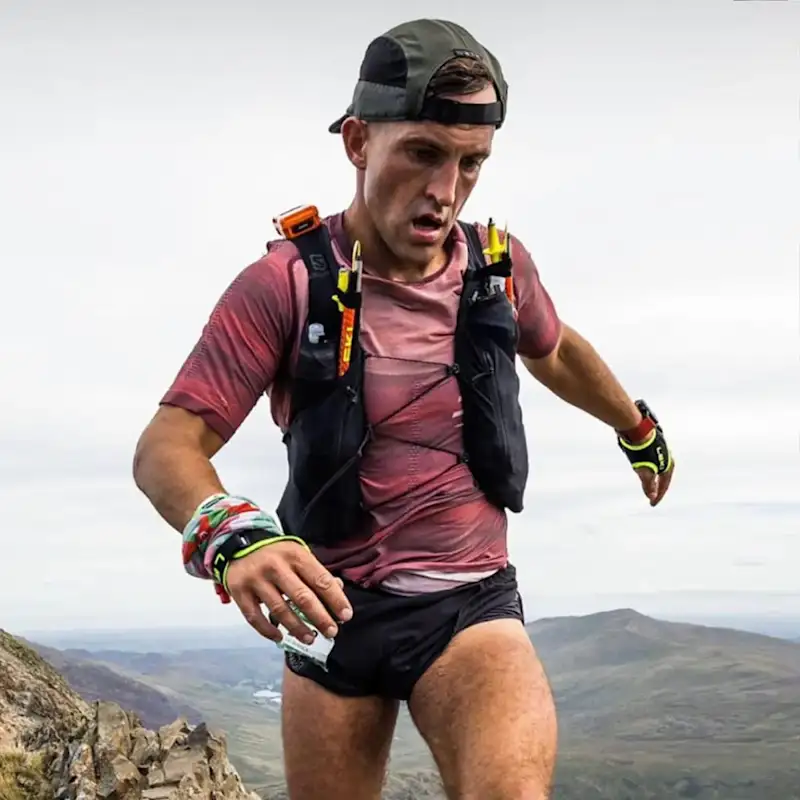
Sam Skinner
Arc of Attrition
Sam's headline numbers
Sam's strategy
Fueling
Carbohydrate is the main fuel you burn when racing. Failing to fuel properly is a leading cause of underperformance in longer races.
For a race of this duration, carb loading is extremely important as it helps to ensure maximal stored energy in the liver and muscles on race day. Sam did this successfully by eating between 8-12g of carbohydrate for each kilo of bodyweight for the 48 hours leading up to the Arc. Along with this, it was important for Sam’s strategy to consider real foods as well as sports nutrition products since it overlapped several meal times. Sam had a general outline for his fueling strategy going into the race which focused on sports energy products for most of it, although he felt incredibly strong cravings for a variety of unplanned items, especially Cola. He ended up consuming everything from minestrone soup and jelly sweets, and was even force fed rice pudding by his supportive crew (somewhat willingly), enabling him to achieve an average carb intake of ~87g per hour. It’s impressive that his self described “granite gut” could tolerate these foods while averaging around seven minutes per kilometre (~11:15/mile) for over 22 hours! Going forward, Sam will be experimenting during training sessions to optimise the format of his carb intake by testing out a variety of different fueling products.
Hydration
Taking on board an appropriate amount of fluid and sodium is essential to maintaining blood volume and supporting the cardiovascular effort needed to perform on race day.
Whilst the absolute amount of sodium and fluid consumed per hour is important, it’s critical to consider these in relation to each other. This is known as 'relative sodium concentration' and it’s expressed in milligrams per litre (mg/L). How much sodium you’re taking in per litre of fluid is more important than the absolute amount taken in per hour.
Sweat sodium concentration (mg/L) is largely genetically determined and remains relatively stable. Knowing how salty your sweat is enables you to replace a good proportion of your sweat losses, which can range from 200-2,000mg/L.
Whilst Sam’s losses are on the moderate side, getting his hydration strategy right is still important if he wants to perform at his best.
Learn moreFor a race in the UK in January, it was evident that the temperature was going to be relatively low over the course of this event, so Sam wouldn’t be sweating a huge amount. Overall, Sam was able to drink an average of ~313ml (10oz) fluid per hour, with a relative sodium concentration of ~1,139 milligrams of sodium per litre (mg/32oz). We know from Sam’s Sweat Test that he loses 819mg of sodium per litre of sweat (mg/32oz), so his intake of ~1,139mg/L was likely more than was required given the temperate conditions. This might well explain the “puffiness” he experienced and his 3kg body mass gain across the race. Sam mentioned that he craved Coca Cola from around mile 21. Affectionately known as the ‘Red Ambulance’ in endurance circles, we often observe athletes who haven’t quite got their strategy dialled in turning to cola during the latter stages of races as it can provide fluid, carbohydrate and some caffeine all at once.
Caffeine
Beyond the Three Levers of Performance (carb, sodium and fluid), caffeine is one of only a few substances that is proven to improve performance for most endurance athletes as it can help stave off mental and physical fatigue.
During extremely long events, especially when they take place throughout the night, it’s common to see athletes exceed the general recommendations of 3-6mg/kg of caffeine. On this occasion, Sam far exceeded this, consuming 20mg/kg. Sam has a high tolerance for caffeine and experienced no adverse effects during the race itself, although he reported excessive post-race sweating. High caffeine intakes combined with muscle damage have been linked to this occurrence. Going forwards, Sam is going to reduce but optimise the timing of his caffeine intake, especially overnight when he’ll be fighting his natural sleep cycle, to exploit caffeine’s 4-5 hour ‘half-life’, and benefit from the increased perceived energy associated with it.
How Sam hit his numbers
Here's everything that Sam ate and drank on the day...
Sam's weapons of choice
Final thoughts
Sam's full stats
Data Confidence?
There is an adequate level of accuracy in the data collected and the numbers reported. The athlete manages to recall what they ate and drank including most specifics (brands flavours quantities plausible estimations of volumes). However there are estimations made within the data which affect the overall confidence level in the data reported.